

List of 20th-century classical composers by birth date. Dmitri Shostakovich. Dmitri Shostakovich in 1942 Dmitri Dmitriyevich Shostakovich (Russian: Дмитрий Дмитриевич Шостакович , tr.
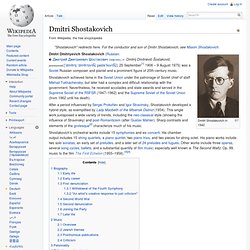
Dmitrij Dmitrievič Šostakovič, pronounced [ˈdmʲitrʲɪj ˈdmʲitrʲɪɪvʲɪt͡ɕ ʂəstɐˈkovʲɪt͡ɕ]; 25 September[1] 1906 – 9 August 1975) was a Soviet Russian composer and pianist and a prominent figure of 20th-century music. Shostakovich achieved fame in the Soviet Union under the patronage of Soviet chief of staff Mikhail Tukhachevsky, but later had a complex and difficult relationship with the government. Nevertheless, he received accolades and state awards and served in the Supreme Soviet of the RSFSR (1947–1962) and the Supreme Soviet of the Soviet Union (from 1962 until his death).
Shostakovich - Piano Concerto No. 2: II. Andante. Shostakovich, Symphony No. 5,Bernstein. Dmitri Shostakovich - Waltz No. 2. Shostakovich Symphony No.5 - Op. 47 (1993) George Gershwin. George Gershwin (September 26, 1898 – July 11, 1937) was an American composer and pianist.[1][2] Gershwin's compositions spanned both popular and classical genres, and his most popular melodies are widely known.
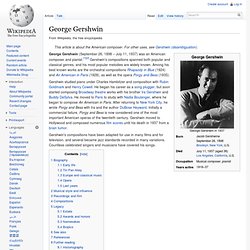
Among his best known works are the orchestral compositions Rhapsody in Blue (1924) and An American in Paris (1928), as well as the opera Porgy and Bess (1935). Gershwin studied piano under Charles Hambitzer and composition with Rubin Goldmark and Henry Cowell. He began his career as a song plugger, but soon started composing Broadway theatre works with his brother Ira Gershwin and Buddy DeSylva. Ella Fitzgerald and Louis Armstrong - Summertime. Summertime by George Gershwin Gershwin plays Gershwin: Rhapsody in Blue Carl Orff. 20th-century classical music. 20th-century classical music was without a dominant style and highly diverse.
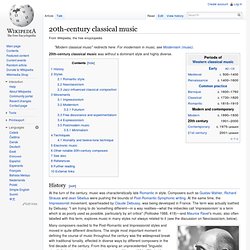
History[edit] At the turn of the century, music was characteristically late Romantic in style. Composers such as Gustav Mahler, Richard Strauss and Jean Sibelius were pushing the bounds of Post-Romantic Symphonic writing. At the same time, the Impressionist movement, spearheaded by Claude Debussy, was being developed in France. The term was actually loathed by Debussy: "I am trying to do 'something different—in a way realities—what the imbeciles call 'impressionism' is a term which is as poorly used as possible, particularly by art critics" (Politoske 1988, 419)—and Maurice Ravel's music, also often labelled with this term, explores music in many styles not always related to it (see the discussion on Neoclassicism, below).
List of 20th-century classical composers by birth date. Ennio Morricone. A Fistful of Dollars - Ennio Morricone. For A Few Dollars More (Theme by Ennio Morricone) The good the bad and the ugly - The best theme tune ever. MORRICONE-"Harmonica/ Man With A Harmonica/ Death Rattle" (1968) Nino Rota. Giovanni "Nino" Rota[1] (3 December 1911 – 10 April 1979) was an Italian composer, pianist, conductor and academic who is best known for his film scores, notably for the films of Federico Fellini and Luchino Visconti.
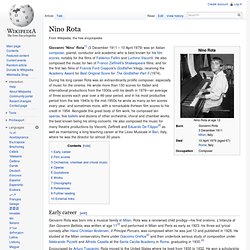
He also composed the music for two of Franco Zeffirelli's Shakespeare films, and for the first two films of Francis Ford Coppola's Godfather trilogy, receiving the Academy Award for Best Original Score for The Godfather Part II (1974). During his long career Rota was an extraordinarily prolific composer, especially of music for the cinema. He wrote more than 150 scores for Italian and international productions from the 1930s until his death in 1979—an average of three scores each year over a 46-year period, and in his most productive period from the late 1940s to the mid-1950s he wrote as many as ten scores every year, and sometimes more, with a remarkable thirteen film scores to his credit in 1954.
Early career[edit] Giovanni Rota was born into a musical family in Milan. Nino Rota Suite (La strada, Il Padrino, Amarcord, I Clowns, Otto e mezzo) Nino Rota, The Godfather 2/2. The Godfather, Nino Rota 1/2. Nino Rota "Romeo and Juliet" Nino Rota. Danze del Gattopardo, Mazurka, Galop. Teatro alla Scala di Milano. 8½ theme - Nino Rota. Michael Nyman. Nyman in 2010 Early life and education[edit] Nyman was born in Stratford, London.
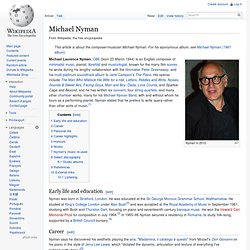
He was educated at the Sir George Monoux Grammar School, Walthamstow. He studied at King's College London under Alan Bush[2] and was accepted at the Royal Academy of Music in September 1961, studying with Bush and Thurston Dart, focusing on piano and seventeenth-century baroque music. He won the Howard Carr Memorial Prize for composition in July 1964.[3] In 1965–66 Nyman secured a residency in Romania, to study folk-song, supported by a British Council bursary.[4] Career[edit] Nyman says he discovered his aesthetic playing the aria, "Madamina, il catalogo è questo" from Mozart's Don Giovanni on his piano in the style of Jerry Lee Lewis, which "dictated the dynamic, articulation and texture of everything I've subsequently done On 7 July 2007, Nyman performed at Live Earth in Japan.
Michael Nyman - The Heart Asks Pleasure First. Michael Nyman - Love Doesn't End. Igor Stravinsky. Igor Fyodorovich Stravinsky (sometimes spelled Strawinsky or Stravinskii; Russian: Игорь Фёдорович Стравинский, transliterated: Igorʹ Fëdorovič Stravinskij; Russian pronunciation: [ˌiɡərʲ ˌfʲjodɐrɐvʲɪt͡ɕ strɐˈvʲinskʲɪj]; 17 June [O.S. 5 June] 1882 – 6 April 1971) was a Russian (and later, a naturalized French and American) composer, pianist and conductor.
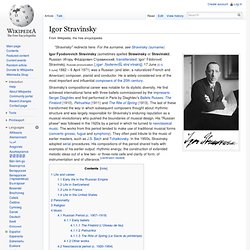
He is widely considered one of the most important and influential composers of the 20th century. Life and career[edit] Early life in the Russian Empire[edit] Stravinsky conducts Stravinsky FIREBIRD COMPLETE. Igor Stravinsky plays Stravinsky Piano Sonata (1924) Sergei Prokofiev. Montagues and Capulets. Prokofiev - Romeo And Juliet - Nureyev. Prokofiev - Peter And The Wolf March. Romantic era/20th century transition composers (1860-1880)